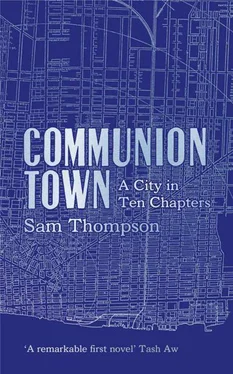‘Cassandra,’ said Peregrine, ‘perhaps you would care to reconstruct what has taken place?’
I nodded, and for some minutes I studied the scene in silence. At last I straightened and exhaled.
‘The sequence of events is apparent,’ I said. ‘Dr Cavendish-Peake was dining by herself, as we know was her practice. Her demise was sudden and dramatic. The restaurant was full and the other diners vacated the room rapidly, as we can see from these overturned chairs. Coats hang abandoned on the hooks beside the exit.
‘How did she die? The puncture mark near the victim’s mouth, and the colour and contortion of the face, give evidence enough of the cause. But if we wish for more, we have it. Note, first, the book which lies closed on her left hand, as if she wishes even now to keep her place: a new academic hardback from Bloodstone Press. Looking closer, we can identify it as a recently issued collection of essays by various contributors, offering new interpretations of the case of the Double Sun — a case in which, as it happens, Dr Cavendish-Peake herself played a part some dozen years ago. In solving it, by the way, she sank a blackmail operation as profitable as it was cruel, and behind which the influence of Lazarus Glass was, if not demonstrable, perceptible.’
Peregrine lowered his head a few affirmative degrees.
‘Beside the book lies a padded envelope addressed to Dr Cavendish-Peake. We can hypothesise that, having received the package earlier in the day, she in all probability delayed opening it and examining the book until she was sitting at the table. Perhaps she was not paying attention as she opened the seal since, for a theoretician of her distinction, deliveries from academic publishers were surely a common occurrence. Closer examination, however, reveals that this was no gift sent in hopes of a favourable review. Peering into the book’s interior where it is held open by her stiffened hand, we notice that a cuboid section has been excised from the central pages with a razor or sharp knife, creating a hollow cell within. When she opened the book, she released what had been imprisoned in this space.’
‘Fiendish,’ said Inspector Nimrod to himself.
‘It sprang at her face, inflicting the injury we see here. She would have begun to feel the effects of the venom at once, and, given her quick perceptions and full acquaintance with the relevant arachnological data, she must have understood the severity of her situation. But she remained alert, and, observing that the instrument of her decease was now scuttling across the floor towards the restaurant’s panicking patrons, she picked up a piece of cutlery and flung it with the necessary force and accuracy to impale the creature that we see here.’
I indicated the point, some distance away, where a pale brown tropical spider the size of my hand was fixed to the floorboards by a obliquely angled steel fork.
‘Alongside her more sedentary accomplishments she was always superb with a throwing-knife,’ said Peregrine.
‘ Phoneutria mortifera ,’ I said. ‘Commonly known as the poison pen spider. Its neurotoxin takes effect with atrocious speed and potency. She would have known that her own case was hopeless, and that protecting the other diners was to be her final action.’
‘This is sound work, Cassandra.’
‘But incomplete. I see what has happened but I cannot tell why.’
‘True. And there I must assist you, because to uncover the why of this scene we must plunge further into those lost times when Electra, like Lazarus and myself, was a precocious neophyte.’
He plunged his hands into his raincoat pockets and contemplated the disarrayed restaurant as he spoke.
‘I have indicated that the nature of Electra’s gifts led her into the abstract and obscure reaches of our discipline. What you must also know is how profoundly Lazarus Glass, at that moment in his development as a young investigator, was influenced by her, this exceptional deductive intellect whom he saw as being always one step ahead on the path to mastery.
‘He would follow her from lecture hall to library, clutching the work of whichever theorist he had discovered most recently, pouring out his latest ideas, always wanting an argument — wanting, too, new ways to gain the advantage in his rivalry with me. Electra, for her part, found in Lazarus a keen interlocutor, and soon realised that while he shared her taste for arcana, in his case this mingled with an impatient pragmatism. He loved strange notions not for themselves but for what they might enable him to accomplish.’
Electra Cavendish-Peake had been developing an unusual theory of detection, Peregrine explained. Instead of the standard casebooks, she was spending days and nights in neglected reading rooms deep in the library, surrounded by heavy, crumbling volumes: Anacratus, Raymond Lully, Giulio Camillo, Giordano Bruno, Johannes Döhl, Robert Fludd. It was clear to Lazarus that she was pursuing some curious line of research, but he had to importune her for some time before she consented to share her ideas; perhaps she intuited, even then, that not she but Lazarus was the person to bring her theory to fruition. She told him that she was exploring what had once been known as the Art of Memory.
At that time, Lazarus had no more than a layman’s understanding of the principles of memoria artificialis : the secret, well known to the ancients, that the human memory could be understood as a physical place, a spatial structure. The long-ago practitioners of the Art had discovered that it was possible to build, in the mind, houses of memory — temples and palaces of memory.
So, for instance, Electra explained, she had already succeeded in constructing a complete mental replica of the Green Stairs townhouse where she had spent her early childhood, recreated in such detail that, although the original building had been destroyed in a fire a decade ago, she could now close her eyes and walk its rooms and corridors just as if she were there once more: and inside her memory house she could store what she wished to remember. She had framed a certain afternoon on the riverbank seven summers past, and hung it in the hallway to be admired whenever she liked. In the garden behind this house of the mind, she had laid out in formal flowerbeds her plans for her career, some of them strong and bright, others no more than frail shoots. Before the sitting-room fireplace lay a Turkish carpet whose pattern she knew by heart, and into its symmetrical figures she had encoded the names of all her personal and professional acquaintances, so that, as she traced the relationships between them, their faces winked up at her from the nodes and buds of the design. And in the glass-fronted bookcases of her father’s study she had arranged every book she had read in her time at the university. She demonstrated this to Lazarus, reeling off the authors’ names alphabetically, then the titles in reverse alphabetical order. She pulled down one or two volumes and read from their opening pages as fluently as if she actually held them in her hands.
Which was a nice trick, said Lazarus, and useful enough as a tool for the busy scholar. But he failed to see how any of this was likely to advance the science of detection. He was missing the point, Electra replied; and, with that, he found he had to persuade her all over again to take him into her confidence. She had no patience with those who did not keep up. She refused to discuss the matter further until he had, at the very least, ameliorated his ignorance of mnemotechnics by reading the essential modern treatises by Yates, Hawksquill and Carruthers.
When he had done so, she relented. To convey to him what she had in mind, she read aloud the passage from the Confessions in which Augustine speaks of the ‘spacious palaces of memory where countless images are hoarded, brought in from all the diverse objects perceived by the senses’, and adds: ‘There too are hidden the altered images we create in our minds by enlarging or diminishing or otherwise transforming the things we perceive.’
Читать дальше
Конец ознакомительного отрывка
Купить книгу












